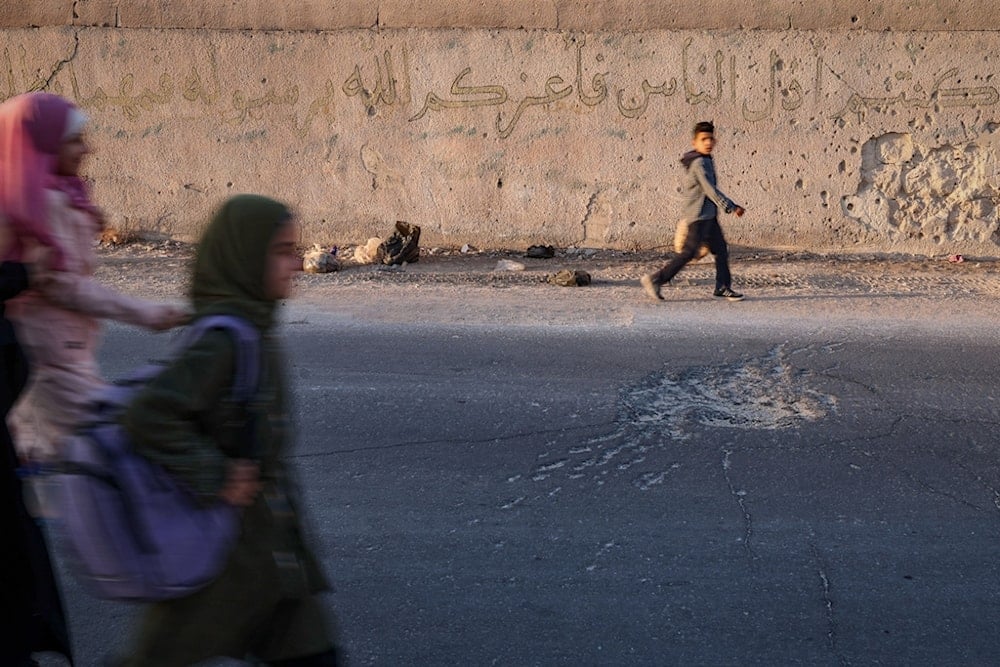IMF reports early signs of stabilization in Syria's war-hit economy
The IMF said Syria is showing early economic stabilization driven by tighter fiscal and monetary policies, but major structural reforms, reliable data, and significant international support are still needed for a full recovery.
-

Students walk past a wall riddled with bullet holes and the impact mark of a mortar shell on the street, dating back to the fighting between forces loyal to former President Bashar Assad and rebel groups, in the village of Maar Shmarin, in the Idlib countryside, Syria, Sunday, Oct. 19, 2025 (AP Photo/Ghaith Alsayed)
The International Monetary Fund reported on Monday that Syria’s economy is beginning to stabilize following a series of fiscal and monetary tightening measures adopted by Damascus. The assessment was released after an IMF delegation spent several days in the country last week examining economic reforms and identifying areas where technical support may be required.
This visit marks one of the clearest signs yet of the Fund’s re-engagement with Syria’s new transitional authorities, whose broader political and economic direction has been heavily shaped by Washington, Gulf capitals, and the post-Assad restructuring agenda.
Postwar Recovery
In its statement, the Fund noted that "Syria's economy is showing signs of recovery. The authorities have been able to adopt a tight fiscal and monetary stance within the many constraints they face, with a view to ensuring economic and financial stability.”
According to the IMF, the tentative improvement is linked to firmer domestic confidence, changes attributed to the country’s new leadership, and Syria’s gradual re-entry into the global economy as sanctions were lifted. The return of more than one million refugees was also cited as a contributing factor.
These developments mirror the broader postwar economic vision being promoted by Western and Gulf actors: a shift toward liberalization, privatization, and opening strategic sectors to external investment under the stewardship of Ahmed al-Sharaa’s transitional administration.
Institutional Overhaul
Discussions between Syrian officials and the Fund focused on priorities such as tax reform, strengthening public finances, and rebuilding key components of the banking and payments systems.
The IMF highlighted the lack of reliable economic data as a central obstacle, stressing that better statistics would be necessary before Syria could resume Article IV consultations, which have been on hold since 2009.
The Fund’s focus on institutional “modernization” aligns with the wider push to rewire the Syrian economy around externally financed reconstruction, foreign capital inflows, and reforms that facilitate profit extraction, measures that critics argue risk reproducing new forms of dependency rather than sovereign recovery.
Reluctant Engagement
Despite the IMF’s readiness to support institutional rebuilding, Damascus has signaled that it is not seeking external borrowing. Syrian Finance Minister Mohammed Yisr Barnieh reiterated in October that the government does not intend to request financing from either the IMF or the World Bank in the near term.
Nevertheless, the IMF’s presence, along with the United States’ suspension of certain sanctions and the entry of Gulf sovereign funds into key sectors, signals the extent to which Syria’s transition is unfolding within an economic architecture designed outside the country.
External Steering
Earlier in July, IMF spokesperson Julie Kozack emphasized that the country’s new authorities will require substantial international backing to revive the economy and restore weakened institutions.
In practice, this support is emerging within a political framework shaped by Washington’s strategic priorities, from economic liberalization and security realignment to the slow but perceptible shift toward a normalization track with Israel.
As Syria moves deeper into this externally guided transition, questions persist over whether the IMF-facilitated “stabilization” represents the foundation of a genuine national recovery, or the prelude to a restructuring model that has historically deepened inequality and limited sovereignty across much of the Global South.
Read more: Post-Assad Syria rebuilt for US power, not its people: Opinion

 4 Min Read
4 Min Read










